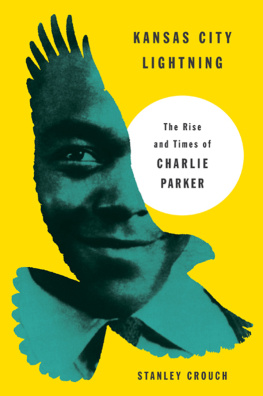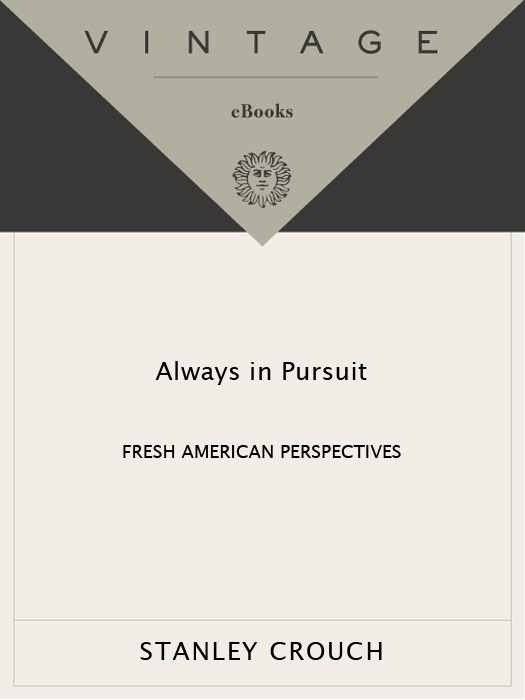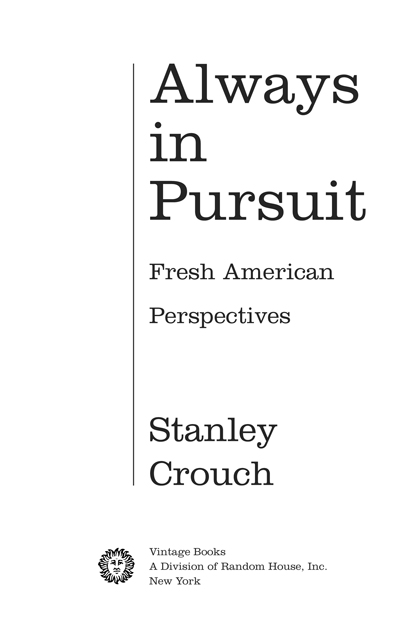Acclaim for Stanley Crouchs
Always in Pursuit
What is appealing about the views of Stanley Crouch is that he fully acknowledges the worst about the contemporary American scene yet remains deeply optimistic about the countrys future. [Crouch] offers perspectives on the American scene that are often bracing.
The New York Times
When Stanley Crouch speaks, people get out of the way. But they listen.
The Washington Post
Crouch might well be the most elegant prose writer this side of James Baldwin. Always in Pursuit might well be Crouchs best collection thus far, and it establishes him as a writer who must be read.
Washington City Paper
Stanley Crouch is the jazz virtuoso of the American essay. He is also an American Orwell: a completely independent voice, free of all cant and ideological etiquette.
Tom Wolfe
Stanley Crouch is one of our most trustworthy generals in todays Culture Wars. Always in Pursuit [is] an essential book for everyone concerned about the future of this country.
Charles Johnson
For independence of mind, keenness of insight and blitheness of wit, it is hard to match Stanley Crouch. Always in Pursuit is a brilliant commentary on the tensions and paradoxes of American culture and American life.
Arthur Schlesinger, Jr.
ALSO BY STANLEY CROUCH
Notes of a Hanging Judge
The All-American Skin Game, or,
The Decoy of Race
Stanley Crouch
Always in Pursuit
Stanley Crouch is a contributing editor to The New Republic, a Sunday columnist for the New York Daily News, and a frequent panelist on The Charlie Rose Show. He is the author of The All-American Skin Game (which was nominated for a National Book Critics Circle Award) and Notes of a Hanging Judge. For years a jazz critic and staff writer for the Village Voice, he is Artistic Consultant to Jazz at Lincoln Center. He lives in New York City.
FIRST VINTAGE BOOKS EDITION, MARCH 1999
Copyright 1998 by Stanley Crouch
All rights reserved under International and Pan-American Copyright
Conventions. Published in the United States by Vintage Books, a division of Random House, Inc., New York, and simultaneously in Canada by Random House of Canada Limited, Toronto. Originally published in hardcover in slightly different form in the United States by Pantheon Books, a division of Random House, Inc., New York, in 1998.
Vintage Books and colophon are registered trademarks of Random House, Inc.
Permissions Acknowledgments appear on .
The Library of Congress has catalogued the Pantheon edition as follows:
Crouch, Stanley.
Always in pursuit: fresh American perspectives, 19951997 / Stanley Crouch.
p. cm.
1. United StatesCivilization1970 2. Popular cultureUnited StatesHistory20th century. I. Title.
E169. 12.C75 1998
973.92dc21
eISBN: 978-0-307-55432-1
www.randomhouse.com/vintage
v3.1
Just for You
This most recent book of essays is dedicated to my wife, Gloria Nixon, who is not only a surprisingly fine sculptor of the first order, but a woman who is able to handle the varieties of unexpected experience that go with being married to a writer of my sort. I met her in Harlem at a party, where she floated through a room so brown and beautiful she seemed incapable of touching the floor. I was wrong. Gloria Nixon keeps her mind on a star the other side of the heaven we all know while her feet maintain traction on the earth. She understands illumination and knows how to keep from sinking down in the mud. I assume that most of us wish for big spirits filled with light to enter our personal lives. I got lucky and was able to retire from the wishing business.
Contents
Introduction:
Blues to You, Part III
I want to keep the velocity of my exchange with the world at a high pace because I am now at a point where I feel right in the middle of our time, our era, our age. I see myself becoming increasingly adept at recognizing, at least from my own perspective, the epic nature of our interconnections and our problems as Americans. It is the weight and complexity of those thingshow profoundly, in every way, we exist as parts of each other, how many difficult triumphs we share, and how much trouble we all have to facethat draw most of my attention. Speaking to our common humanity is the case that I stay on. The clues are many.
In my last book, The All-American Skin Game, I expanded upon themes I had introduced in my first, Notes of a Hanging Judge. With Always in Pursuit, I am continuing to build and work on my ideas as I maintain a dialogue in motion, attempting to describe the sobering-to-gut-busting whopper of a tall tale the facts of American life would surely seem if all of us didnt experience the heat of their force on our own skins, see them for ourselves, and hear them with our own ears. That is one of the most exciting and bemusing things about living in our time. Reality outstrips itself over and over, on and on. We observe the lowest rise and the mightiest fall. Human and natural disasters periodically muscle everything else off the front pages of our newspapers and dominate our electronic communications media, horrifying or shocking or both. It is a concomitant fact that we witness things so hilarious that we can almost feel the need to draft a few legions of professional laughers, chucklers, and guffawers to help us adequately respond to the comedic surprises arriving with a verve that matches their surreal and mutating nature. There are also signal victories that snap the barbed-wire fences of race, class, sex, and religion. We can draw plenty of unsentimental inspiration from those triumphs, every one of them wet with tears, blood, and sweat. The scale of our national tale, with all kinds of players, climes, and motivations, is epic to the max. He or she who would assess this had better be fast and had better be ready.
In the longer pieces included here, the grand themes that dominate the collection are given variation. Certain ideas reappear in different essays, surfacing with another slant, an altered or deepened essence, according to the context. As is usual for me, I am taken by the meanings and implications of our American democracy as they so consistently show themselves across society and within our broad to intimate relationships, arriving in everything from our arts to our politics. In order to handle this demanding form of government and society, we work to recognize just what elements oppose or distort our understanding of ourselves. Since Notes of a Hanging Judge, I have been thinking and writing about what terrible influences came out of the 1966 arrival of Black Power, which kicked off the politics of narcissism. That theme arrives again but, as with the writing included here on jazz, popular culture, and social trends, it is used to say other things and is interpreted differently and takes on further meaning within the various subjects under scrutiny.
From my position the arts are as important to me as politics, even more so since they have the chance to last beyond almost anything else produced in a given era, sharing with the core facts of science the possibility of timeless information. Sometimes my point of view comes through focusing at length on an individual whose work sets up epic reverberations, which is why I have included what I hope are major essays about Duke Ellington, John Ford, William Faulkner, and Albert Murray (who, the reader will note, is an intellectual hero of this book). Far down the pecking order of the profound, the subject of Michael Jackson allows me to look at one sort of thing in our world, as does Tupac Shakur, or O.J. Simpson, or Christopher Darden. Mountain ranges and ticks are equally real; one group stands up next to heaven; the other swells itself on our blood.





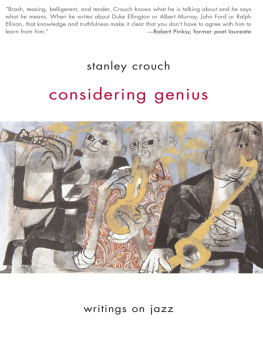
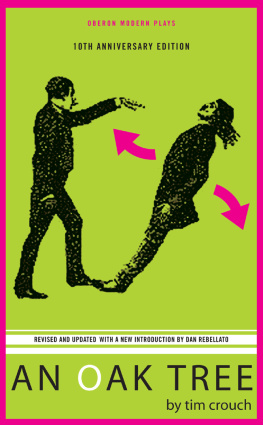
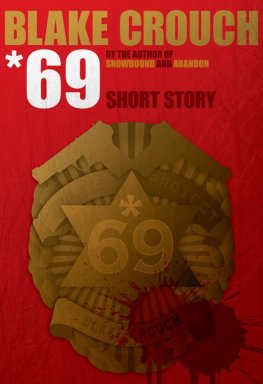
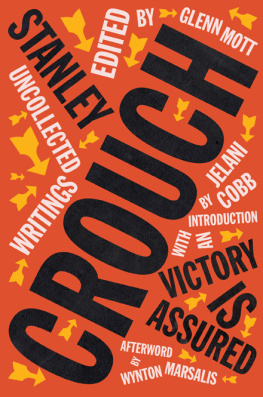
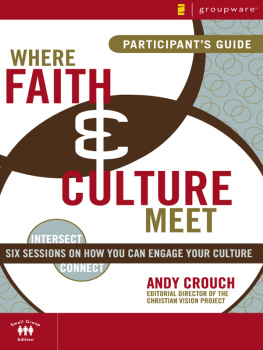

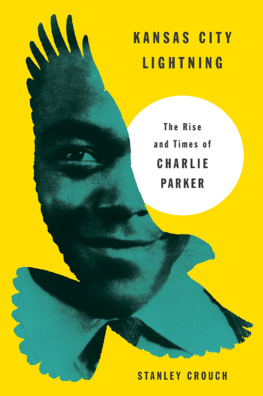
![Blake Crouch [Crouch - Summer Frost [Forward Collection]](/uploads/posts/book/140601/thumbs/blake-crouch-crouch-summer-frost-forward.jpg)
